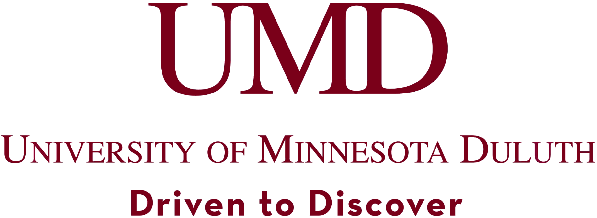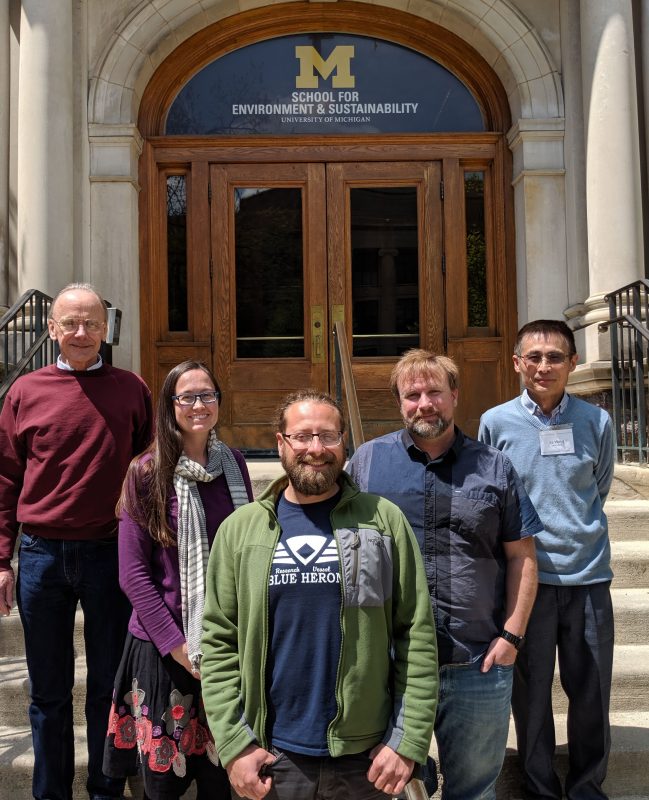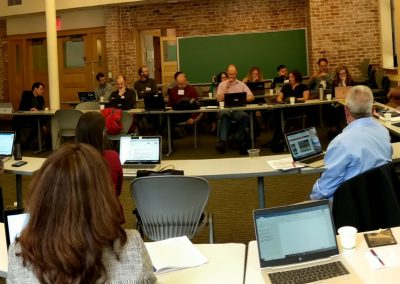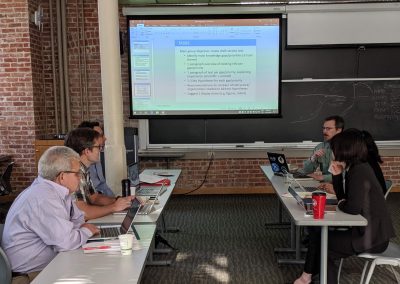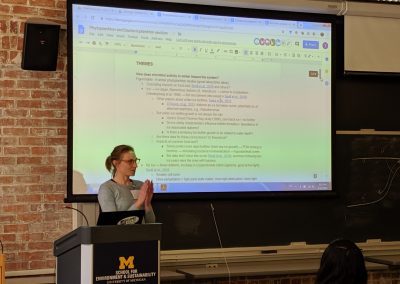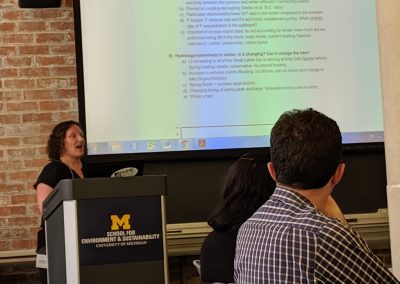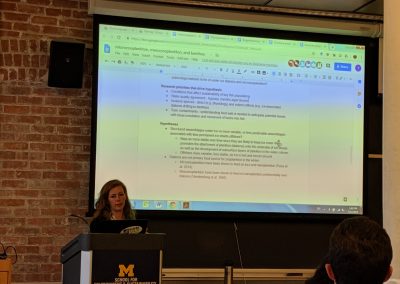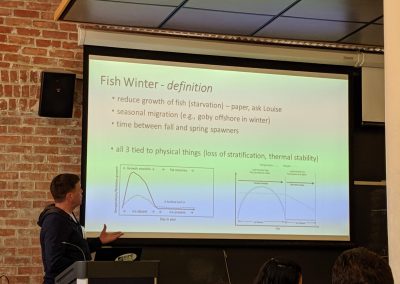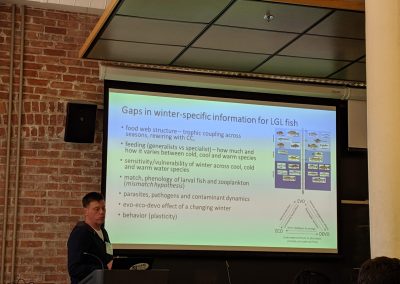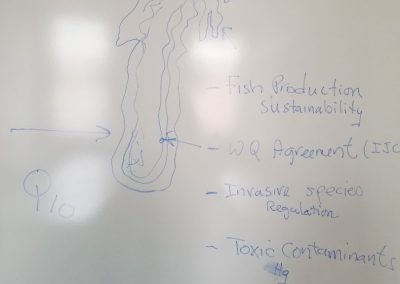Winter Limnology on the Great Lakes – Prospects and Research Needs
Dates: May 13-15, 2019
Leads: Dr. Ted Ozersky, University of Minnesota-Duluth; Henry Vanderploeg, NOAA Great Lakes Environmental Research Laboratory; Andrew Bramburger, University of Minnesota-Duluth; Jia Wang, NOAA Great Lakes Environmental Research Laboratory; Ashley Elgin, NOAA Great Lakes Environmental Research Laboratory
GLERL Research Program: Integrated Physical and Ecological Modeling and Forecasting icon Integrated Physical and Ecological Modeling and Forecasting and Ecosystems Dynamics
About: CIGLR is in our fourth year of hosting Summits and Working Groups focused on identifying the most pressing research and management needs to achieve sustainability in the Great Lakes. We are pleased to welcome an exciting summit to the University of Michigan this spring that seeks to better understand what happens in the Great Lakes during winter.
Evidence from the Great Lakes and elsewhere shows that winter is not a “dead season,” and that events and conditions in winter affect the rest of the annual cycle in aquatic systems. Yet, winter has remained grossly understudied in seasonally frozen lakes, including the Great Lakes. The extent of the winter knowledge gap and the rapid change in winter conditions in recent years make it vital to improve our collective understanding of winter processes through research. This summit will be the first multi-institutional meeting focused specifically on winter limnology in the Great Lakes.
From May 13-15, 2019 scientists representing academic institutions and government research agencies from the United States and Canada with expertise in Great Lakes limnology, including remote sensing, physical modeling, plankton and benthic ecology, and fisheries biology, will gather at the University of Michigan to summarize what is known, identify major knowledge gaps, and propose research priorities and opportunities for improved understanding of Great Lakes winter limnology.
The summit is being led by Dr. Ted Ozersky from the University of Minnesota-Duluth.
Goals: 1) Create an informative, accessible, attractive and citable summary of the history of winter research on the Laurentian Great Lakes (LGL), main research priorities and hypotheses for moving science forward and some ideas of how to get there. Ideally, this will be published in a “general” interest journal such as Global Change Biology (as a ‘report’-type contribution), BioScience, Frontiers in Ecology and the Environment, etc. 2) Facilitate exchange of ideas and catalyze future collaboration between researchers interested in LGL winter limnology.
Summit Products
- Pu, G., Shchapov, K., Pearce, N.J.T., Bowen, K., Bramburger, A., Camilleri, A., Carrick, H., Chaffin, J.D., Cody, W., Coleman, M.L., Currie, W.J.S., Depew, D.C., Doubek, J.P., Eveleth, R., Fitzpatrick, M., Glyshaw, P.W., Godwin, C.M., McKay, R.M., Munawar, M., Niblock, H., Quintanilla, M., Rennie, M., Sand, M.W., Schraitle, K.J., Twiss, M.R., Uzarski, D.G., Vanderploeg, H.A., Vick-Majors, T.J., Westrick, J.A., Wheelock, B.A., Xenopoulos, M.A., Zastepa, A. and Ozersky, T. (2024). The Great Lakes Winter Grab: Limnological data from a multi-institutional winter sampling campaign on the Laurentian Great Lakes. Limnol. Oceanogr. Lett. (DOI:10.1002/lol2.10447). [Altmetric Score]
- Ozersky, T., Bramburger, A.J., Elgin, A.K., Vanderploeg, H.A., Wang, J., Austin, J.A., et al. (2021). The changing face of winter: Lessons and questions from the Laurentian Great Lakes. Journal of Geophysical Research: Biogeosciences. 126, e2021JG006247. (DOI:10.1029/2021JG006247). [Altmetric Score]
Summit Participants
- Jay Austin, University of Minnesota Duluth – Large Lakes Observatory
- Andrew Bramburger, University of Minnesota-Duluth
- Hunter Carrick, Institute for Great Lakes Research, CMU
- Louise Chavarie, University of British Columbia
- Maureen Coleman, University of Chicago
- David Depew, Environment and Climate Change Canada
- Melissa Duhaime, University of Michigan
- Ashley Elgin, NOAA Great Lakes Environmental Research Laboratory
- Aaron Fisk, University of Windsor – GLIER
- Alex Forrest, UC Davis
- Ayumi Fujisaki-Manome, University of Michigan – CIGLR & Climate and Space and Science Engineering
- Stephanie Hampton, National Science Foundation
- Beth Malloy Hinchey, US EPA GLNPO
- Mike McKay, University of Windsor – GLIER
- Guy Meadows, Michigan Tech – GLRC
- Rebecca North, University of Missouri-Columbia
- Dr. Ted Ozersky, University of Minnesota-Duluth
- Mark Rowe, NOAA GLERL
- Steve Ruberg, NOAA GLERL
- Sapna Sharma, York University
- Allison Steiner, University of Michigan – Climate and Space Sciences and Engineering
- Michael Twiss, Clarkson University
- Henry Vanderploeg, NOAA Great Lakes Environmental Research Laboratory
- Jia Wang, NOAA Great Lakes Environmental Research Laboratory
- Mathew Wells, University of Toronto Scarborough
- Marguerite Xenopoulos, Trent University
- Arthur Zastepa, Environment and Climate Change Canada
